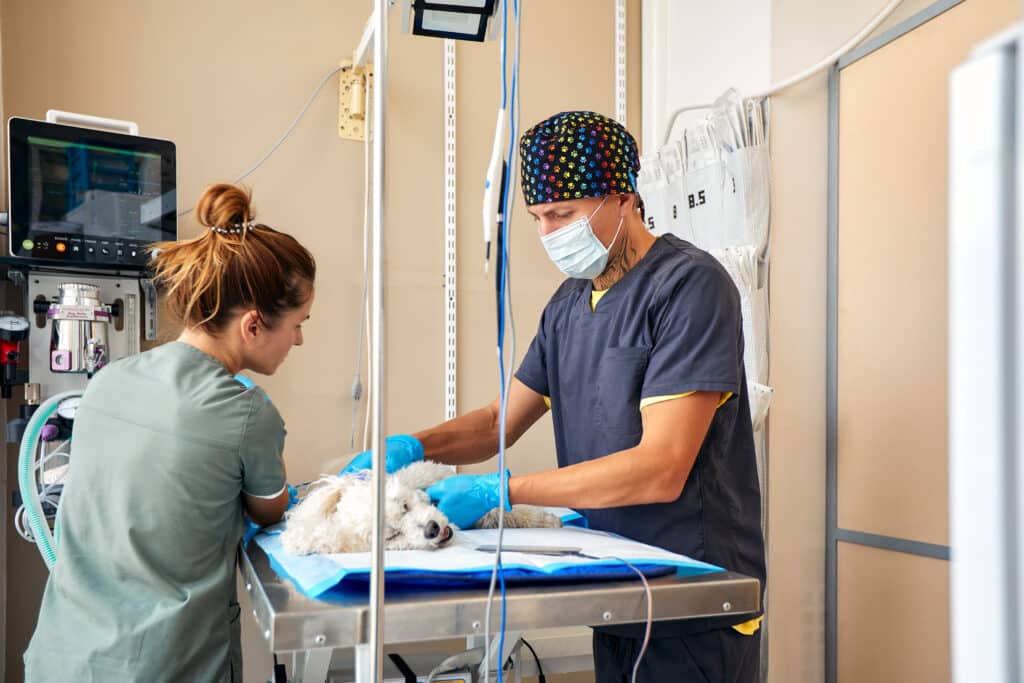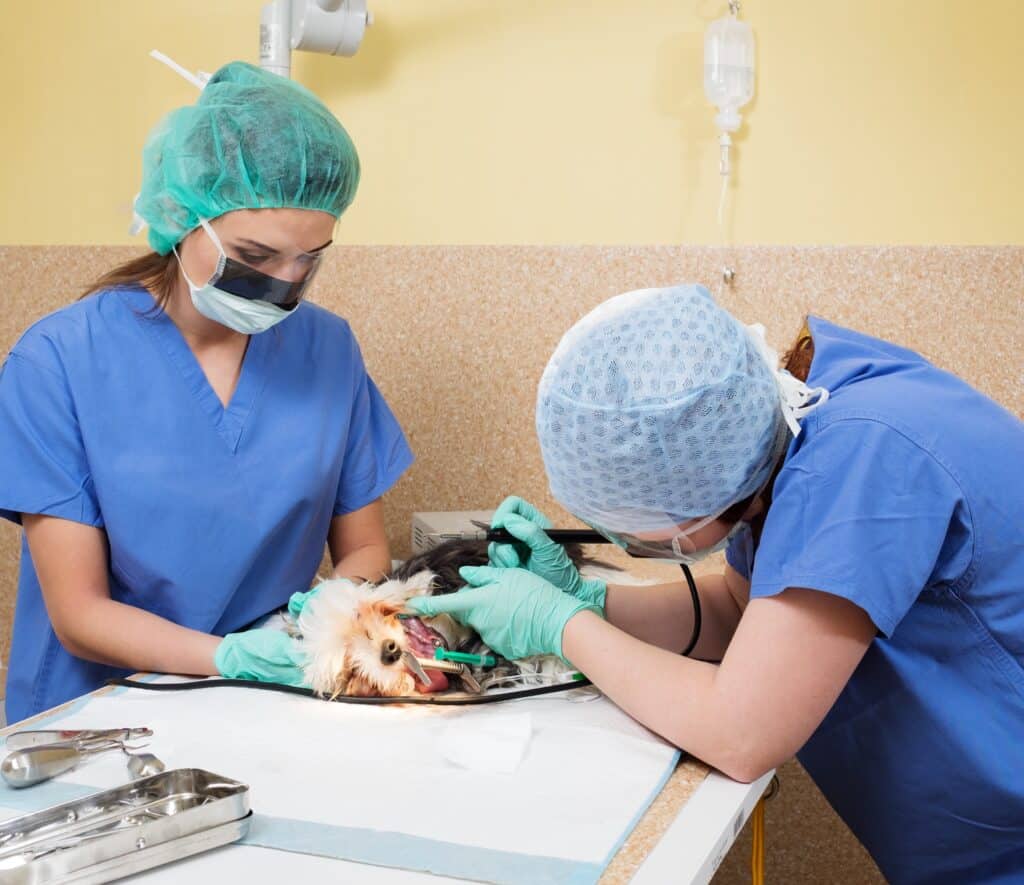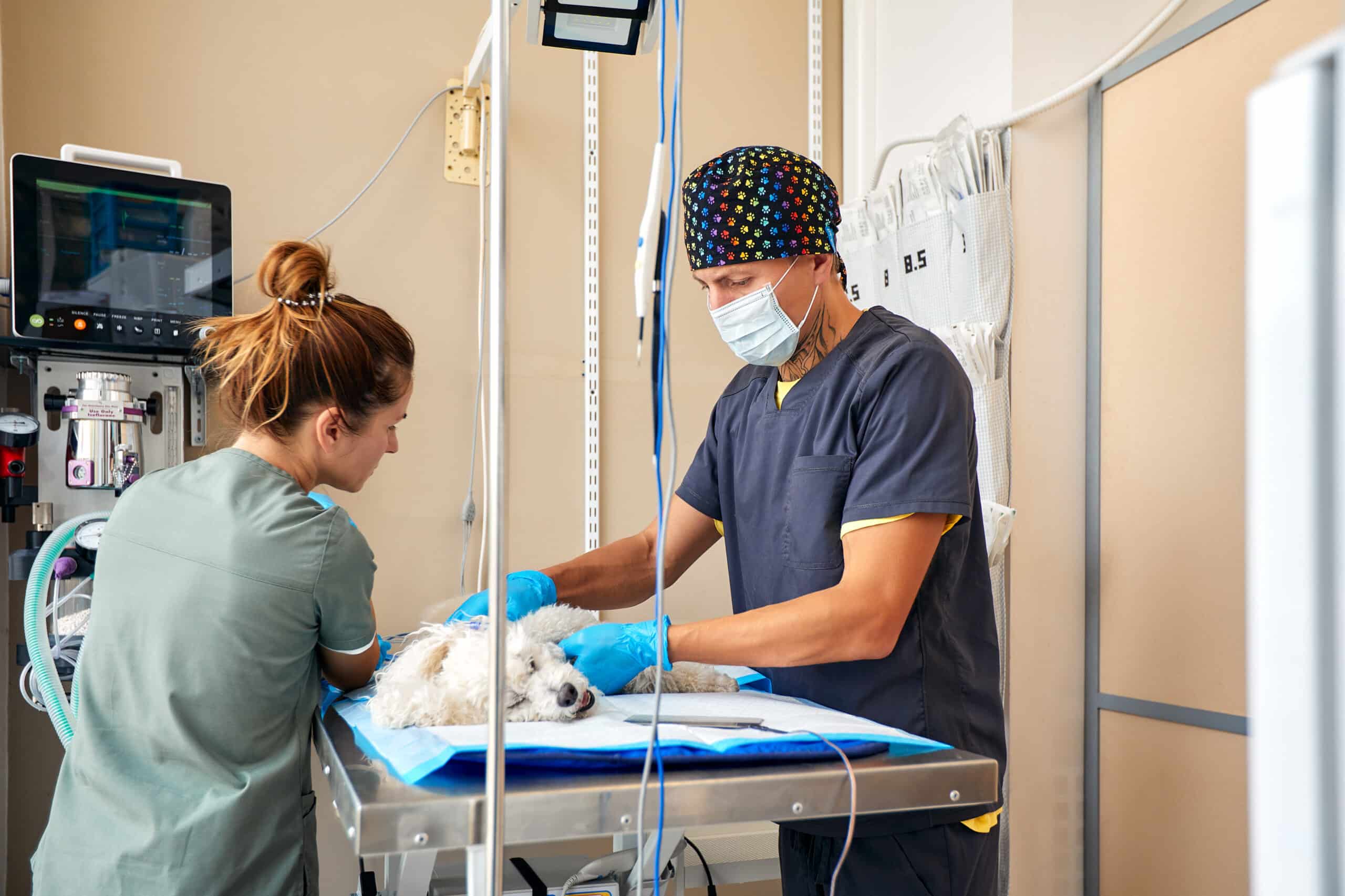If you love pets, enjoy being around animals, and want to be in a surgical team that only serves animals, then a career as a Surgical Vet Tech is just for you.
Surgical Vet Techs are professionals who assist veterinarians during surgical procedures, ensuring the well-being of animals.
In this article, we’ll discuss about Surgical Veterinary Technologists, their duties, skills, education and training, eligibility criteria for certification, different certifications, earning potential, and much more.
Moreover, we’ll also discuss how you could start this career, how long will it take, and the pros and cons associated with this career.
So without further a due, let’s get started.

What Is a Veterinary Surgical Technologist?
A veterinary surgical technologist is a specialized veterinary technician who assists veterinarians during surgical procedures, ensuring the well-being of animal patients and maintaining the sterility and functionality of surgical equipment.
Their role is critical in ensuring that surgeries are performed safely and effectively, and they must possess both technical skills and a deep understanding of veterinary medicine.
Whether working in a bustling veterinary clinic or assisting in critical surgeries, Surgical Veterinary Technicians play a vital role in the holistic care of animals, showing dedication to their profession and commitment to excellence in veterinary surgical practices.
Duties
A Surgical Veterinary Technician plays a vital role in assisting veterinarians during surgical procedures. Their responsibilities include a range of tasks before, during, and after surgery to ensure the safety and well-being of animal patients.
Here are the primary duties:
Pre-Surgical Preparation
They prepare the operating room by ensuring all surgical instruments and equipment are sterilized and ready for use.
They set up the surgical site and assist in preparing the animal patient by shaving and disinfecting the area to be operated on.
They administer pre-surgical medications and anesthesia under the direction of the veterinarian.
Assistance During Surgery
They assist the veterinarian during surgical procedures by handing instruments, monitoring the patient’s vital signs, and maintaining a sterile environment.
They ensure all instruments and supplies are readily available and properly functioning.
Post-Surgical Care
Besides cleaning and sterilizing surgical instruments and equipment after the procedure, they monitor the patient as they recover from anesthesia, check vital signs, and provide post-operative care instructions to the pet owners.
Patient and Client Communication
They communicate with pet owners about the surgical process, post-operative care, and any follow-up treatments or medications.
They provide emotional support and guidance to pet owners before and after the surgery.
Administrative Tasks
They maintain accurate medical records, including detailed surgical notes and patient progress reports.
They order and manage surgical supplies and ensure the surgical suite is stocked.
Read:
-> What Does a Surgical Tech Do?
Skills of a Surgical Vet Tech
To become a surgical vet tech, besides a love for animals, you need to possess some technical skills.
Here are the skills:
- Proficiency in using surgical instruments and equipment.
- Strong understanding of anesthesia and pain management.
- Ability to perform diagnostic imaging and lab work.
- Attention to detail in maintaining a sterile environment and accurately monitoring patient vitals.
- Ability to explain complex medical procedures and post-operative care to pet owners in a clear and compassionate manner.
- Capable of standing for long periods and handling animals of various sizes and temperaments.
- Empathy and Compassion towards the needs of both the animals and their owners, providing reassurance and support throughout the surgical process.
Education and Training
To become a Surgical Veterinary Technician, aspiring candidates must undergo specialized education and training to develop the necessary skills and knowledge for assisting in veterinary surgeries.
Typically, they need to enroll in an associate degree program in Veterinary Technology accredited by the American Veterinary Medical Association.
The associate degree programs are typically offered at community colleges, technical schools, and some universities and usually take two years to complete.
You May Also Like:
-> Online Surgical Tech Programs
-> Surgical Tech Classes & Courses
-> Surgical Tech Program & Training
-> Surgical Tech Certificate Program
-> Surgical Tech Programs And Schools
Course Curricula include:
- Animal anatomy and physiology
- Veterinary pharmacology
- Animal nursing and care
- Laboratory and diagnostic procedures
- Surgical Nursing and Techniques
- Anesthesia administration
- Radiology
- Veterinary ethics and law
Certifications
After completing the veterinary technology program, graduates must pass a certification exam to become certified as a Veterinary Technician.
To get certified as Vet Tech you have 2 options:
NAVLE (North American Veterinary Licensing Examination)
The ICVA (International Council for Veterinary Assessment) administers the NAVLE. It is designed for both vet techs and veterinarians.
This computer-based exam includes 360 multiple-choice questions and is offered twice a year in the U.S. and Canada, with a fee of $760.
VTNE (Veterinary Technician National Exam)
The AAVSB (American Association of Veterinary State Boards) administers the VTNE. It is intended for entry-level vet techs.
It is also a computer-based exam but has 170 multiple-choice questions to be completed in three hours. The VTNE is offered three times a year and costs $355.
However, most states require vet techs to pass the VTNE exam to qualify for employment, some states also have their own specific exams in addition to the national ones.
VTS Certification (Veterinary Technician Specialist in Surgery)
VTS is designed for veterinary technicians seeking specialized certification in surgical procedures. To get certified as a Surgical Veterinary Technician, you must meet the eligibility criteria and successfully pass the VTS (Surgery) or Veterinary Technician Specialist in Surgery exam conducted by the Academy of Veterinary Surgical Technicians (AVST).
Pre-Application eligibility criteria
- Proof of graduation from an AVMA-accredited program
- Minimum of 10,000 hours (5 years) of experience as a veterinary technician, including 6,000 hours (3 years) in a small animal surgical setting, with at least 4,500 hours (75% of the surgical experience) specifically dedicated to performing veterinary surgical tasks.
- Proof of Credentials (a VTNE Certification would do)
- 40 hours of CE record obtained after becoming credentialed
- Resume
After you meet this eligibility then you can proceed with the final application.
Final Application eligibility criteria
- AVST Advanced Small Animal Surgical Skills List
- Skill Photographs
- Gas Sterilization Certificate
- AVST Case Log (50-75 cases)
- Supplemental Continuing Education Record
- CE hours
- Abbreviations List
- 4 Case Reports
- Letter of Intent
- 2 Letters of Recommendation
- Letter(s) of Explanation
- Waiver, Release, and Indemnity Agreement
Fees
Pre-Application Fee: $25
Final Application Fee: $50
Exam Fee: $150
Salary And Job Outlook

According to BLS, the annual average salary of Vet Surgical Tech was $43,740 with an hourly rate of $21.03, in May 2023. The top 10% earned an average salary of about $59,310, while the lowest 10% earned around $30,180.
Job opportunities can be found in various settings such as private veterinary clinics, animal hospitals, research facilities, and specialty veterinary practices.
According to the BLS veterinary technologist and technician’s projected employment growth from 2022 to 2032 is 21%. As per this data, an average of 14,800 openings are projected for each year over the decade.
This demand for veterinary technicians including surgical vet techs, will only grow with time due to a significant increase in the pet population and advancements in the veterinary field.
Read More:
-> Surgical Tech Job Description
How to Become a Surgical Vet Tech?
By pursuing a career as a Veterinary Surgical Technologist, individuals can play a vital role in the health and well-being of animal patients, providing critical support to veterinarians and ensuring successful surgical outcomes.
Here’s a quick guide to help you become a Surgical Vet Tech:
Step 1 -> Possess a High School diploma certificate
Step 2 -> Enroll in an AVMA-accredited associate degree program
Step 3 -> Get VTNE certified
Step 4 -> Meet eligibility to take up VTS (Surgery) certification
Step 5 -> Get VTS (Surgery) certified
Step 6 -> Start looking for job opportunities
Also Read:
-> How To Become A Surgical Tech?
-> Pros And Cons Of Being A Surgical Tech
-> How To Become A Certified Surgical Tech?
-> How Long Does It Take To Become A Surgical Tech?
How Long Does It Take to Become a Surgical Vet Tech?
Becoming a Surgical Veterinary Technician requires dedication and time.
First, you must enroll in an accredited associate degree program, which typically takes about 2 years to complete.
Next, you need to become certified as a Veterinary Technician and gain 5 years of experience in both general and surgical veterinary fields.
Following this, you’ll prepare for and take the rigorous VTS (Surgery) exam. Only upon passing this exam will you officially earn the title of Surgical Veterinary Technician.
Ultimately, to become a Surgical Veterinary Technician you would typically need to invest around 8 to 10 years.
Pros and Cons of Surgical Vet Tech Career
Choosing a career as a Surgical Veterinary Technician involves dedication to animal health and a commitment to mastering specialized skills in surgical procedures.
This role plays a crucial part in veterinary care, assisting veterinarians during surgeries and ensuring the well-being of animal patients. While it offers numerous rewards, it also comes with challenges that professionals in this field must navigate.
Pros of Surgical Vet Tech career
Here are the advantages of a Surgical Vet Tech career –
Direct Impact on Animal Health
Surgical Veterinary Technicians directly contribute to improving the health and recovery of animals undergoing surgical procedures.
Their hands-on involvement ensures that surgeries are conducted safely and efficiently, thereby enhancing the quality of life for animal patients.
Specialized Expertise and Professional Growth
Surgical Vet Techs acquire specialized skills in surgical techniques, anesthesia administration, and post-operative care, through accredited education programs and certification exams like the Veterinary Technician National Examination (VTNE).
This expertise not only makes them valuable assets in veterinary practices but also opens doors to career advancement opportunities, such as obtaining the Veterinary Technician Specialist (VTS) certification in Surgery.
Diverse Career Settings
Surgical Vet Techs have the flexibility to work in various environments, including veterinary clinics, emergency hospitals, research facilities, and specialty practices.
This diversity offers opportunities to explore different aspects of veterinary medicine and find a niche that aligns with their interests and career goals.
Fulfilling Work and Passionate Community
Taking care of animals and helping them get better can bring a lot of satisfaction. Working with other veterinary professionals who care deeply about animals creates a supportive and teamwork-focused workplace.
Cons of Surgical Vet Tech Career

Here are the disadvantages of a Surgical Vet Tech career –
Educational and Certification Requirements
Becoming a Surgical Vet Tech involves completing an accredited associate degree program, passing certification exams such as the VTNE, gaining practical experience, and then gaining a VTS (Surgery) certification.
The rigorous educational and certification requirements demand dedication, time, and financial investment from aspiring professionals.
Also Read:
-> Surgical Tech Certification
-> Can You Be A Surgical Tech Without Certification?
Physical Demands and Workload
The job requires physical stamina to stand for long periods, lift and position animals, and assist during surgeries. This physical demand, coupled with high workloads during emergency surgeries or critical care situations, can lead to fatigue and burnout if not managed effectively.
Salary and Financial Considerations
Salaries for Surgical Vet Techs can vary based on factors such as geographical location, type of practice, and level of experience.
According to BLS, the annual average salary of Vet Surgical Tech was $43,740 with an hourly rate of $21.03, in May 2023.
Emotional Challenges
Dealing with the emotional aspects of caring for sick or injured animals, as well as handling the stress of difficult surgical outcomes, can be emotionally taxing for Surgical Vet Techs. Building resilience and coping mechanisms are essential aspects of this role.
Read:
-> Is Surgical Tech School Hard?
Conclusion
We hope this article enlightens you about the Surgical Vet Tech career, how you could become one, and the pros and cons of this career.
It’s true that a career as a Surgical Vet Tech offers meaningful opportunities to make a positive impact on animal health and well-being. But, the hectic education requirement and daunting certification eligibility criteria might turn out to be a deal breaker for many.
Finally, if you’ve changed your mind, and want to become a surgical tech, there’s an online program that allows you to achieve that faster in just 4 months, at an affordable price.
Besides that, you get an accredited non-profit university certificate, externship placement, and become NCCT certification-ready.
Related:
-> CVOR Tech
-> Scrub Nurse Vs Surgical Tech
-> 6-Week Surgical Tech Program
-> Surgical Tech Vs Surgical Assistant





